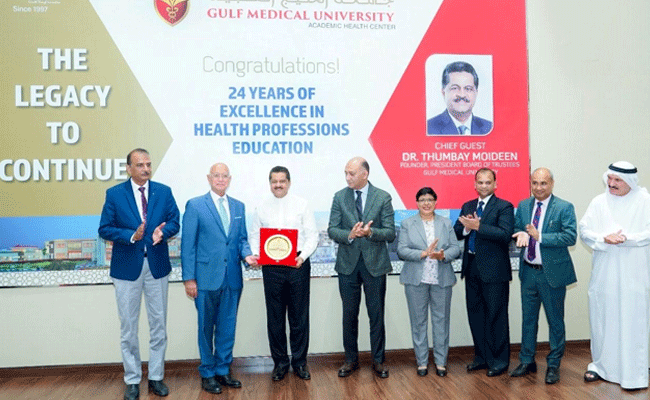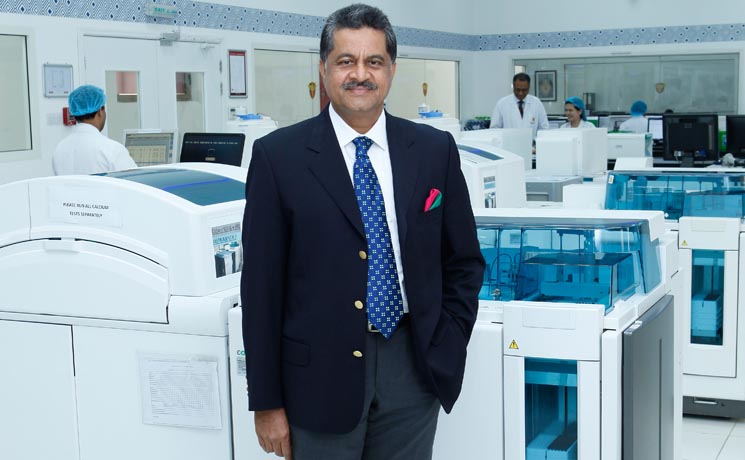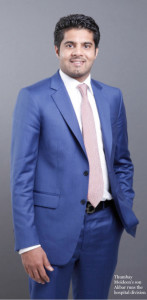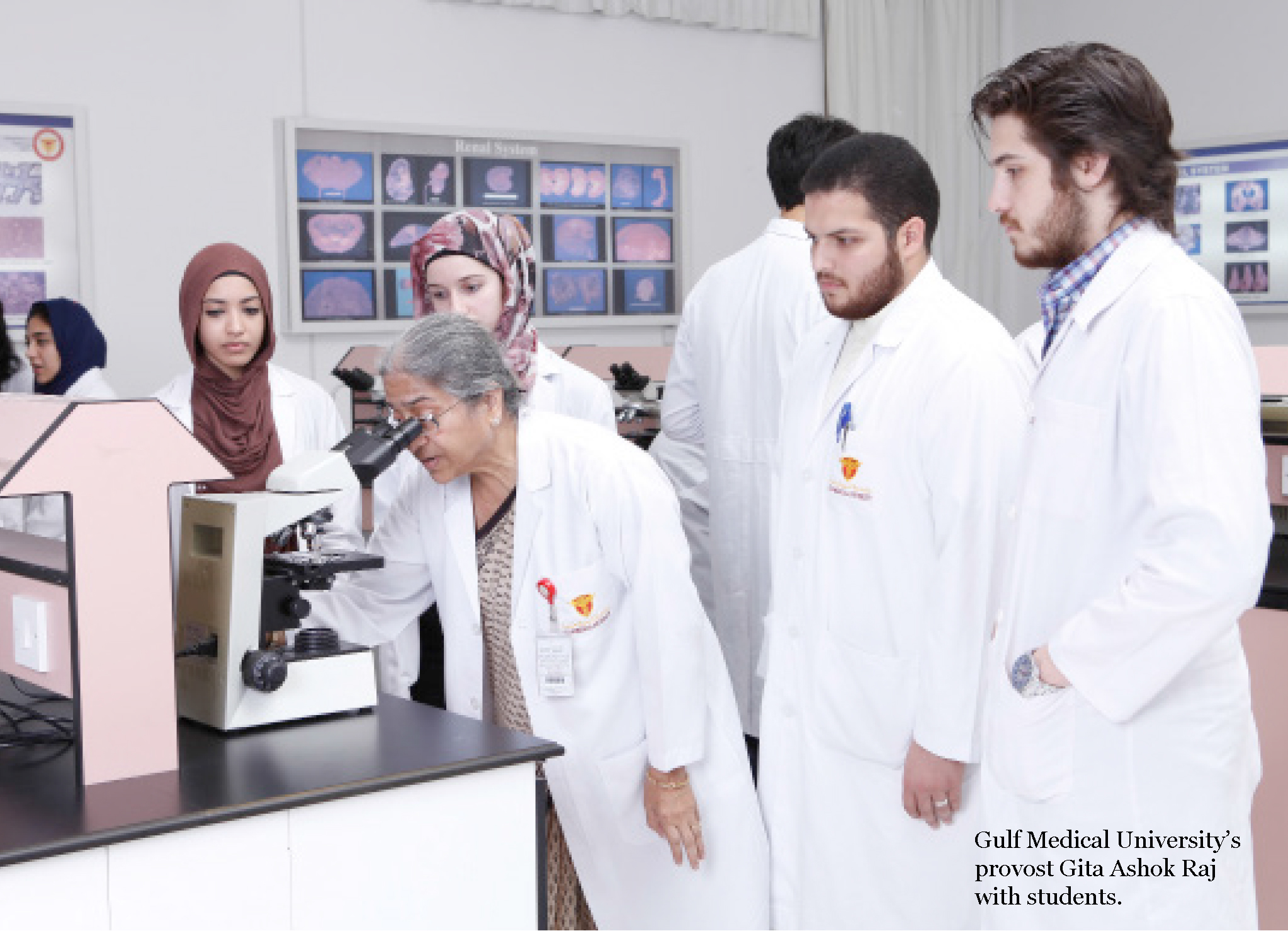Mangaluru, KARNATAKA /Ajman, U.A.E :

Ajman :
Gulf Medical University (GMU), Ajman, the biggest private medical university in the Middle East region celebrated its 24th anniversary, with a special ceremony attended by Dr. Thumbay Moideen – Founder, President Board of Trustees GMU, Prof. Hossam Hamdy – Chancellor of GMU, Mr. Akbar Moideen Thumbay – Vice President of the Healthcare Division of Thumbay Group, and Deans of the colleges of the University as well as other staff and students.
The celebration was an occasion to reflect GMU’s achievements till date, at the same time reaffirming its commitment to foster continued evolution of Gulf Medical University as an international powerhouse of health professions education, research and innovation.
Highlighting the evolution and development of the Gulf Medical University in terms of buildings, staff, students and scientific and educational degrees, Dr. Thumbay Moideen said, “From humble beginnings as the region’s first private medical University, today GMU is a testament of along and distinguished success story of being the region’s only private Academic Health System- delivering futuristic medical education at the same time playing an important role in providing state-of-the-art healthcare and promoting innovative research.
Our progress over the last 24 years has been driven by the dedication of our staff, students and partners, in addition to GMU’s philosophy of constant innovation and above all, the Grace of the Almighty. We have also received excellent support from the government throughout this journey.
Prof. Hossam Hamdy said that GMU has developed a unique model in the form of the Gulf Medical University Academic Health System, showcasing on a global front that the future of medical education is ‘systems’ linking education, healthcare and research. “The shared philosophies of the six colleges under Gulf Medical University, its teaching hospital and the passion for supporting all-round excellence has helped in making many distinctive contributions to the overall community over the last two decades. In addition, our response to the COVID-19 pandemic has demonstrated the great value of our academic community and the strengths of our basic, convergent and translational science.”
Recently, the ‘Academic Team’ at Gulf Medical University unveiled a long-term strategic growth plan of doubling its capacity in the next three to four years, aligning to future requirements and strategic direction of education policies laid down by the United Arab Emirates and thereby creating an Emirati healthcare workforce to serve the region
Gulf Medical University and Thumbay network of academic hospitals daycare, Labs, Pharmacies and clinics together train around 20 percent of the doctors and approximately 60 percent of the healthcare professionals in the country, creating a significant impact on the healthcare sector of the country and the region.
Moreover, students benefit with adequate opportunities to showcase their achievements through student activities, Interprofessional skills, sporting and cultural events that train them to be multi-disciplinary experts.
Other benefits provided to the students include: Clinical training sites of unmatched quality at 8 hospitals, 10 clinics, 5 labs and 48 pharmacies and a total of 700 beds; tie-ups with other local entities as clinical training sites with over 400 qualified faculty, doctors and adjunct faculty who provide one-on-one clinical training to students and quality care to the patients of UAE; access to technological platforms and an outstanding infrastructure for research on imaging, functional genomics, sequencing with NGS facility.
In terms of advancing healthcare in the UAE and globally, GMU has launched the establishment of the first liquid biopsy facility in the region, the zebra fish and a platform for drug discovery and development. This has led to achieving its position as a leader in research in medical education in UAE and the entire region with 70% of all papers published in medical education in the UAE coming from GMU.
Since its inception, around 2000 students have graduated from GMU, advancing their career and securing successful positions including CEOs, COOs, Medical Directors and Heads of Departments in the healthcare and research across the Middle East, Africa, South Asia, Europe, North America and Australia.
Moreover, the university’s academic and research tie-ups with over 70 international universities and research institutions has ensured global recognition and employability for GMU graduates.
To name a few, GMU’s collaboration with International Federation of Red Cross and Red Crescent Societies (IFRC) has led to humanitarian learning in healthcare to create a model youth force in the country that will be equipped with all the basic skills and knowledge to fight any emergency crisis as per international standards.
Likewise, the ‘Future Scientist program’ has been an innovative educational enrichment internship program for Male/ Female Emirati talent who are motivated to nurture their interest in biomedical and drug discovery research. The program helps in preparing them for an exciting career as research scientists.
Recently, GMU has also achieved international accreditation by the Quality Assurance Agency (QAA)-the agency responsible for accrediting higher education institutions in the UK utilizing european standards and guidelines for Quality assurance.
Besides, Gulf Medical University has won several global recognitions such as Forbes, Dubai Quality Award, QS Awards, QS Reimagine WRC Leaders and Ranking from QS University Rankings, Times Higher Education, placing placed the university among top health professions education institutions in the region and globally.
source: http://ww.english.varthabharati.in / Vartha Bharati / Home / by press release / November 21st, 2022












